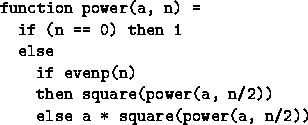
Equations 1 and 2 specified how the work and depth complexities could be combined in an apply-to-each. In the current implementation there are a couple caveats. The first concerns work complexity. In the following discussion we will consider a variable constant with regards to an apply-to-each if the variable is free (not bound) in the body of the apply-to-each and is not defined in bindings of the apply-to-each. For example, in
{foo(a,b*c): b in s}
the variables a and c are free with regards to the apply-to-each, while b is not. We will refer to these variables as free-vars. In the current implementation all free-vars need to be copied across the instances of an apply-to-each. This copying requires time, and the equation for combining work complexity that includes this cost is:

where the last term has been added to Equation 1
( ![]() refers to the length of the sequence returned by e2(b),
and
refers to the length of the sequence returned by e2(b),
and ![]() refers to the size of each free-var). If a free-var is
large, this copy could be the dominant cost of an apply-to-each. Here
are some examples of such cases:
refers to the size of each free-var). If a free-var is
large, this copy could be the dominant cost of an apply-to-each. Here
are some examples of such cases:
In both cases the work is a factor of #a greater than we might expect since the sequence a needs to be copied over the instances. As well as requiring extra work these copies require significant extra memory and can be a memory bottleneck in a program. Both the above examples can easily be rewritten to reduce the work and memory:

The user should be conscious of these costs and rewrite such expressions.

A second problem with the current implementation is that Equation 2
(the combining rule for the depth) only holds if the body of the
apply-to-each is contained. The definition of contained code is
code where only one branch of a conditional has a non-constant depth.
For example, the following function is not contained because both
branches of the inner if have ![]() :
:
This can be fixed by calculating power(a, n/2) outside the conditional:

function power(a, n) =
if (n == 0) then 1
else
let pow = power(a, n/2)
in if evenp(n)
then square(pow)
else a * square(pow)
In future implementations of NESL
it is likely that this restriction
will be removed.
{